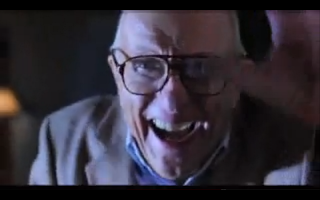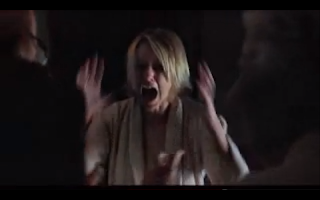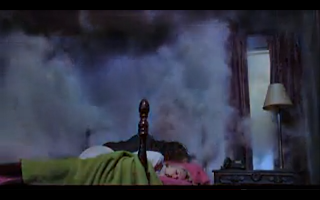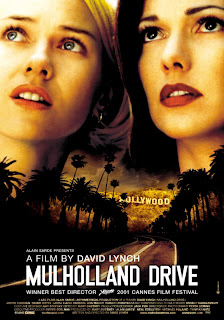 A series of blogs are going to analyze the end of the movie Mulholland Drive through three different perspectives. Firstly, Mulholland drive has successfully pleased audience in a primitive way by creating certain environments. Secondly, the end of movie evokes feelings of helplessness and confusion. Last but not the least, this movie strongly proved that cinema exists as a haunted body and organization of consciousness.
A series of blogs are going to analyze the end of the movie Mulholland Drive through three different perspectives. Firstly, Mulholland drive has successfully pleased audience in a primitive way by creating certain environments. Secondly, the end of movie evokes feelings of helplessness and confusion. Last but not the least, this movie strongly proved that cinema exists as a haunted body and organization of consciousness. 
Search Post
Sunday, December 4, 2011
Behind the Scene
 A series of blogs are going to analyze the end of the movie Mulholland Drive through three different perspectives. Firstly, Mulholland drive has successfully pleased audience in a primitive way by creating certain environments. Secondly, the end of movie evokes feelings of helplessness and confusion. Last but not the least, this movie strongly proved that cinema exists as a haunted body and organization of consciousness.
A series of blogs are going to analyze the end of the movie Mulholland Drive through three different perspectives. Firstly, Mulholland drive has successfully pleased audience in a primitive way by creating certain environments. Secondly, the end of movie evokes feelings of helplessness and confusion. Last but not the least, this movie strongly proved that cinema exists as a haunted body and organization of consciousness. Primitive Pleasure
 Why the Mulholland Drive pleased the audience in a primitive way? It is better to know that why people love scared movies before we understand this question. As Science Daily reported, “Horror movie viewers are happy to be unhappy. This novel approach to emotion reveals that people experience both negative and positive emotions simultaneously -- people may actually enjoy being scared, not just relief when the threat is removed.” (ScienceDaily) In other words, for some people, to be scared is a kind of primitive pleasure. The Mulholland Drive has successfully created this kind of pleasure for the audience in its last 10 minutes.
Why the Mulholland Drive pleased the audience in a primitive way? It is better to know that why people love scared movies before we understand this question. As Science Daily reported, “Horror movie viewers are happy to be unhappy. This novel approach to emotion reveals that people experience both negative and positive emotions simultaneously -- people may actually enjoy being scared, not just relief when the threat is removed.” (ScienceDaily) In other words, for some people, to be scared is a kind of primitive pleasure. The Mulholland Drive has successfully created this kind of pleasure for the audience in its last 10 minutes. Diane's Suicide
The end of the movie starts with a pan up from the blue key to a medium close-up shot to the dull Diane in her dark room.
 After that, it cuts the blue key and Diane in one medium shot. By now, the director has created a sense of anxious feeling for the audience.
After that, it cuts the blue key and Diane in one medium shot. By now, the director has created a sense of anxious feeling for the audience. The scaring music starts playing while the eye match shot cutting back and force between Diane and the key. As an audience, one will easily get nervous after seeing the close-up shot of the scared Diane and hearing a frightening soundtrack.
The scaring music starts playing while the eye match shot cutting back and force between Diane and the key. As an audience, one will easily get nervous after seeing the close-up shot of the scared Diane and hearing a frightening soundtrack. 
A climax is pending. With the sudden tap, the lightening on Diane’s eye, and the screaming grandparents, not only Diane, but the audience is almost going to pieces.



 Finally, Diane crumbled after seeing the chasing grandparents, and she kills herself with handgun. Everything is gone but the smoke. Silence takes over everything and helps to smooth the audience’s tension.
Finally, Diane crumbled after seeing the chasing grandparents, and she kills herself with handgun. Everything is gone but the smoke. Silence takes over everything and helps to smooth the audience’s tension. Memories and Illusions
With the soundtrack starting again, beautiful memories of the happy time between Diane and Camillar begin to flash on the screen on the background of a night city. Everybody is moved by the love between these two girls at this moment. (Maybe it is just Diane’s love) Unfortunately, the director does not give us time to feel sorry about this love. He cuts to the Silent Pub and confuses us by showing the women with blue hair saying “silencio”. However, if you think it more carefully, it seems that the director was trying to make it more like an illusion not confusion.
Symbolization
Although the end of the Mulholland Drive is about what is happening in reality, it still evokes plenty feelings of helplessness and confusion. Taking the blue key and the elderly couple as examples, several things have made the audience confused.
key
 What does the blue key mean and what does it open? The blue key appears several times both in Diane’s dream and in reality. In reality, the blue key is a secret code between the hit man and her after the murder. Diane is frustrated by the feelings of guilt and fear when she sees the key because she will find out whether Diane died or not by using it to open the blue box. In this sense, the blue key can not only open the blue box but also open the darkness, the worst parts in Diane’s soul. Some people suggest the blue key also represents several other things such as searching, penis, love, fear and murder. Furthermore, according to Dream Dictionary, “To see a key in your dream, symbolizes opportunities, access, control, secrets, or responsibilities. You may be locking away your own inner feelings and emotions. As with most dreams, look for the obvious connections by comparing the details or the theme of your dream to your daily life. Are you trying to figure something out and "unlock" a puzzling question? Do you wish to hide something? Are you locking something up or are you opening the door?” (Dream Dictionary)
What does the blue key mean and what does it open? The blue key appears several times both in Diane’s dream and in reality. In reality, the blue key is a secret code between the hit man and her after the murder. Diane is frustrated by the feelings of guilt and fear when she sees the key because she will find out whether Diane died or not by using it to open the blue box. In this sense, the blue key can not only open the blue box but also open the darkness, the worst parts in Diane’s soul. Some people suggest the blue key also represents several other things such as searching, penis, love, fear and murder. Furthermore, according to Dream Dictionary, “To see a key in your dream, symbolizes opportunities, access, control, secrets, or responsibilities. You may be locking away your own inner feelings and emotions. As with most dreams, look for the obvious connections by comparing the details or the theme of your dream to your daily life. Are you trying to figure something out and "unlock" a puzzling question? Do you wish to hide something? Are you locking something up or are you opening the door?” (Dream Dictionary) THE ELDERLY COUPLE
 If someone looks back the last 10 minutes of Mulholland Drive, he probably will question why the elderly couple appears again and what the identity of the eldly couple is. Some people believe the elderly couple represents parental figures. There is another opinion says the old couple is just an excuse for Diane to comfort herself. “When things do not work out the way Diane has hoped, she concludes that she was the victim of some scheme by the seemingly kind couple.”(Lost on Mulholland Drive)
If someone looks back the last 10 minutes of Mulholland Drive, he probably will question why the elderly couple appears again and what the identity of the eldly couple is. Some people believe the elderly couple represents parental figures. There is another opinion says the old couple is just an excuse for Diane to comfort herself. “When things do not work out the way Diane has hoped, she concludes that she was the victim of some scheme by the seemingly kind couple.”(Lost on Mulholland Drive) It is more interesting if you consider this couple as Adam and Camilla. Their appearances are pretty much similar and you can also explain why the elderly couple chasing Diane in the end of the movie by using this theory. They are seeking vengeance because Diane had them murdered.
Character Identification
 The end of Mulholland Drive is a good example to prove that cinema exists as a haunted body and organization of consciousness. It sutures the audience into the film by using character identification. Diane is a loser in her love story. She loves Camillar, and at the same time, she also lives under her wing because Camillar helped Diane out all her life and career. That makes the relationship more complicated. When Diane wakes up from her dream, she falls into guilty and extreme fears. Diane’s struggle in her mind simply reflects people’s conflicting thoughts about love and hate. With the camera eye, we as audience are also pending mental collapse. Moreover, Diane’s choice of suicide seems reasonable for us because every murder will make the same decision. Isn’t it possible that we are Diane at that moment, so that we can only relief by our death?
The end of Mulholland Drive is a good example to prove that cinema exists as a haunted body and organization of consciousness. It sutures the audience into the film by using character identification. Diane is a loser in her love story. She loves Camillar, and at the same time, she also lives under her wing because Camillar helped Diane out all her life and career. That makes the relationship more complicated. When Diane wakes up from her dream, she falls into guilty and extreme fears. Diane’s struggle in her mind simply reflects people’s conflicting thoughts about love and hate. With the camera eye, we as audience are also pending mental collapse. Moreover, Diane’s choice of suicide seems reasonable for us because every murder will make the same decision. Isn’t it possible that we are Diane at that moment, so that we can only relief by our death? The end of Mulholland Drive has created a primitive pleasure for the audience by irritating their sensory feelings. On the other hand, It evokes plenty feelings of confusion by using symbolism. Lastly, it has successfully sutured us into the film by using the camera and the soundtrack.
Reference
Dream Dictionary (2000): Key Retrieved April 1, 2010 from: http://www.dreammoods.com/dreamdictionary/k.htm
Science Daily (1995): Why Do People Love Horror Movies? They Enjoy Being Scared Retrieved April 1, 2010 from: http://www.sciencedaily.com/releases/2007/07/070725152040.htm
Monday, April 18, 2011
Surf the Web On a Smart TV
Digital receivers are bringing the Internet into millions of living rooms. Television manufacturers, feeling the competition from the digital receivers like Roku and Apple, are promoting smart TVs with similar services. In addition to streaming media from a few specific sites, many modern smart TVs also provide you with an integrated Web browser. With a smart TV, you can sit in your living room and enjoy your social media network in a 50” LCD instead of the little 13” laptop screen. Actually when I heard this news, I was surprised because I had tried to connect my laptop with the TV screen to watch movies before, but I still needed to manipulate and set up everything on my laptop. Right now I could really surf the net on a TV. While some opinions argue that one no longer need to run a TV and a laptop or tablet at the same ime with a smart TV, I also couldn’t help thinking whether cable company will like it or not. As we know, there are so many sites provide TV channels online. I myself always watch NBA game on the Internet. Although the image quality is not as good as a TV, it could still challenge these TV cable companies in my opinion. These custom browsers are similar to those on your PC, and they include the basics you need for navigation and bookmarking. So instead of reaching for your laptop to search Wikipedia while you’re in front of the TV, you can do it all with one device. TV-based web browsing can be easy or awkward, depending on the interface. Maneuvering around a browser using arrow buttons can sap the fun from the experience, and trying to enter words with a remote can lead to intense frustration. Then there’s a new technology from LG called Magic Motion. It’s similar to a Nintendo Wii controller. You simply point the Magic Motion remote control at the screen and a little cursor follows the remote’s movement. You can enter text by clicking keys on a virtual keyboard. ----18:54, 24 March 2011 by loresjoberg.
Sunday, April 17, 2011
Secure Online-Identity
Yesterday, after
a long time, I decided to see how's going on my stock account. Unfortunately
, I
forgot my password of my online account.
The reason is that I got so many passwords that sometimes I can’t
remember them. I had tried to log in again and again until the stock system
locked me for wrong passwords. I had to
call my home agent back in China for help. Anyway, I didn't surffer a big lose
since the stock market in China hasn’t change rapidly for a long time.
Nonetheless, I also read a news says president Barack Obama unveiled an
ambitious proposal to create a trusted-identity system to boost consumer
security in cyberspace. These two things again remind me the term of online
privacy. I myself was a victim of some
form of identity theft in the past years, but I didn’t surprise at all as long
as I haven’t lost very important information like bank account because I know
this is the normal risk one should face when he or she using Internet. As a
matter of fact, it already becomes a very big big privacy concern when people
using Internet nowadays. I believe most
people, like me, sometimes want to make sure you and the only you can access
sensitive information. You might have a lot of passwords, too many to remember
them all, or maybe you use the same password many times. The proposal made by
Obama argues in either way, ID thieves can get or steal your password and
pretend to be you. Now there is a group
of private and public organizations think there is a better way. They are
building an identity equal system, where consumers and businesses can more confidently
conduct transactions on line. If you decide to participate, you need to pick
one or more private or public secure ID providers to prove your identity. That company or publicity issue your credential,
it might be a secure ID application on your iPhone, a smart card, or other
devices. Your credential proves you and most online providers no loner need
your personal information. You can use your trusted ID for sensitive
transactions and not use for others like serving the web. Your ID provider will
not know how you use your credential. There is no central database tracking
your actions. In the new cyber world, with trusted IDs, online transactions are
safer and more convenient. In this way,
one could control the access to personal information. Nevertheless, I don’t
know if this proposal will help to solve the hard problem in America, but the
ideas sounds good for me.
Wednesday, April 6, 2011
Media convergence
Nowadays, thanks to the thousands of new media technologies, consumers have more choices. Marketing competition speeds up the innovation, and consumers’ loyalty will decline because of another more convenient media technology. Moreover, today’s consumers are more active which means their desires have been expended, and their requirements are more nitpicky. I think that is why Facebook has been more popular than regular blogs. Facebook provides us so many choices such as writing blogs, chatting with friends, sharing pictures, videos so that consumers can reach all their desires in one single web site.
I have watched an interesting video on YouTube yesterday, basically, this video portrays that students are out of self-control when they are facing distractions brought by new technologies. As a matter of fact, this is a normal phenomenon which I can see every day in every class. Once a student opens a YouTube video in his laptop, nobody behinds this student will focus on the professor anymore. I am one of them. However, not every student behaves like us or like what was described in the video. Still, there are a lot of students focusing in class and taking notes carefully instead of chatting or watching YouTube. Although I believe people should be self-disciplined all the time, I can’t deny people have different study habits. I have many friends who can get a very high grade even they watch videos in each class. The most important lesson we should know in this information society is that: control the technology so that you will not be controlled by the technology. What recalls me after watching this video again is the term called media convergence. I have noticed that laptop, facebook, cellphones have all been mentioned in this short video. They are examples of the media convergence which mentioned in our readings. By just looking at students’ behaviors in class, I am startled of the influence which brought by media convergence.
Why Do Some Countries Block YouTube
The YouTube banning trend is getting popular. Every week we hear of some country that has decided to protect its oversensitive citizens from the horrors of video sharing by blocking YouTube. Since I have talked YouTube in two of my blogs, I get a feeling that I have to talk something about YouTube and censorship (if politics is too wide). And, I just want to express some personal experiences and thoughts. However, I guess none of my opinions can be correct just because in real life, I can never find a correct answer for a certain political issue.
Sometimes, I am really happy that I can enjoy watching YouTube again after I came to Canada. YouTube came into my life when I was in middle school in China. At that time, YouTube hadn’t been banned yet and I just enjoyed watching NBA videos on it every day. However, I watched it not because there were no other sites provide NBA videos. It just feels cool for a teenager to watch NBA in a foreign website. It really doesn’t mean much to me. So when YouTube was banned, without much sadness, I moved to another Chinese site which actually provides better NBA videos. But why does government ban YouTube? Two Comments I found on the Internet are quite typical answers.
“To control information, usually. It can be hard for a government to run a successful propaganda campaign if people can go to the web and find the truth on their own.”--- IMHO Brain
“Finally, China and India currently have no active ban on YouTube, but both states have on occasions threatened to block the video sharing website; India because of a video clip mocking Gandhi, and China because of their general policy of banning, well, all kinds of stuff.” --- Stan Schroeder
It is believed by the public that countries which banned YouTube in the world are the countries have less democracy. However, it is not fair to conclude that citizens could find the truth on a banned website. Take me as an example, as a Chinese citizen, I was much clear than anybody else on the reason why they ban YouTube. As a matter of fact, in China, most of the people who know how to use Internet know the reason why the government bans it. And you know what; they have many ways to see what happened there in that banned site. Porn videos are not permitted, but every boy has some in their laptops. (Not every boy LoL) And believe me; it is much easier to visit YouTube than download a porn video. The fact is people are more curious about things they are not allowed to see. It actually reminds me what American government did for Wikileaks. In this information society, whenever there is a government, there is secret. We are all fed with information in a manner that they choose. In my point of view, any comment laughing at other countries’ information policy is like a Chinese saying: the pot calls the kettle black. Nevertheless, I wish some day in the future, Chinese government could be the first one which is brave enough to face any expression of opinion in front of their people.
Subscribe to:
Comments (Atom)





